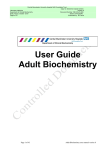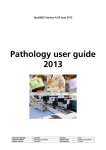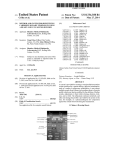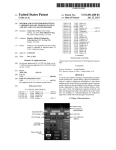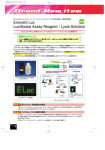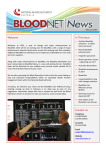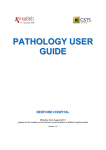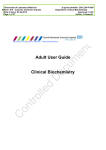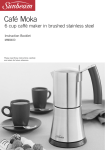Download Welcome to the user guide handbook for Biochemistry and
Transcript
BS/M20 Rev 18 01/10/14 Welcome to the user guide handbook for Biochemistry and Haematology. The aim of this handbook is to provide key information for those wishing to use the laboratory service. If you note any errors or omissions please do not hesitate to contact the department. Also please feel free to contact the duty biochemist for any clinical/analytical queries relating to biochemistry tests Location Blackburn The laboratory is situated on Level 0 of the Royal Blackburn hospital site. During the hours of 9:00 to 17:00 Monday to Friday and Saturday 9:00 to 12:00 Laboratory Reception is open to visitors. Outside these hours the outer doors will be open to Trust staff only for the collection of blood for transfusion from blood bank. At all times, only persons will be allowed access to the laboratory areas. Out-patients do not attend the department for any blood sampling. Venepunctures are now performed in the out-patients suite which is situated on Burnley site The laboratory is in the main hospital building close to the Surgical Day Case unit. Core hours are 09:00 to 17:00, Monday – Friday. Patient samples should be delivered to GP Practices where they will be collected by hospital transport. Out of hours there is no access to the laboratory and samples should be delivered to the laboratory at RBH Opening Hours The department provides a full 24/7, routine diagnostic service including week-ends and all statutory holidays. All samples will be analysed for the common tests as soon as possible on arrival to the Laboratory, irrespective of the time of day or night. Core hours for Blood Sciences are 9am to 5pm. The out-of-hours service is manned by a limited number of staff between 5pm and 9am. Please keep use of the service to a minimum between these times to enable us to provide the most efficient urgent and emergency service in these periods. For results and general enquiries please contact the laboratory on: Blackburn 84144 Burnley 14507 For clinical enquiries relating to biochemistry please contact a clinical biochemist: Dr K Brownbill 84153 Dr M Pickersgill 82176 1 BS/M20 Rev 18 01/10/14 Key Personnel & Contact Information Replace leading 8 with 73 for external telephone number Clinical Staff Clinical Director & Consultant Clinical Biochemist Dr K Brownbill 84153 Consultant Clinical Biochemist Dr M Pickersgill 82176 Consultant Haematologists Dr M Rokicka 82141 (Out of hours the consultant Haematologists and Biochemists are contactable via switchboard) Transfusion Practitioners Mrs L Mannion Mrs M Sokolowski 83568 82498 Point of Care Team Samantha Kelsall Claire Yates Saraj Ulldin 82870 Directorate Business Manager: Mr J Cottam 84106 Pathology Service manager Mr D squires 84162 Pathology IT manager Mr H Briggs 82473 Blood Sciences Managers (Biochemistry and Reception) Mr I Lancaster Mr C Flynn 82490 82488 Blood Sciences Manager (Haematology) Mr S Rigby 82458 Laboratory (Blackburn) Results & Enquiries GP Supplies 84144 82974 Laboratory (Burnley) Reception 14507 Directorate Staff Chief Biomedical Scientist Staff Laboratory Enquiries 2 BS/M20 Rev 18 01/10/14 Request forms and identification policy To ensure rapid return of results to the originating source, request forms and sample containers must be fully identified. This should include: Key request form identifiers: Forename and Surname Hospital or NHS number Date of Birth Address where possible Gender Location Requestors name Type of specimen Date and time of sample collection Tests required All relevant clinical data Key specimen container identifiers Forename and surname Date of Birth Time and date of collection Points indicated in RED are mandatory requirements. The laboratory will not process requests where there is insufficient information for unequivocal identification of the patient. Phlebotomy Service Blackburn Site A ward phlebotomy service is available at RBH (Monday to Friday) A limited service is available on Saturdays and Sundays to aid patient flow If the Phlebotomist is unable to attend, notice will usually be given. In these circumstances, and at all other times, ward staff must collect the blood samples and arrange their delivery to Clinical Laboratory Medicine Burnley site No phlebotomy service is available on the BGH site 3 BS/M20 Rev 18 01/10/14 Specimen Transport An air tube system is available for transporting samples to the laboratory’s main specimen reception from departments within the Hospital. Air tube Policy All samples must be in a sealed specimen bag attached to a completed request form before being placed in the carriers. Carriers must contain bubble wrap and be closed securely at both ends. (Bubble wrap available) This system is available for Biochemistry and Haematology and Microbiology samples 24hrs a day 7 days a week. During normal working hours, bulky/heavy samples (e.g. 24 hour collection bottles), patient collected samples (e.g. semen samples) and samples for histology should be delivered by hand to laboratory reception. Only one set of Blood Cultures (not glass) should be placed in a carrier at one time. The following must NOT be sent by air tube: Glass containers Any leaking sample Blood gas samples Items over 1.5kg Any sharps Any histology samples in formalin Cytology samples. CSF samples Any samples requiring immediate processing (within 30 minutes) eg insulin, C-peptide, Renin Due to the pressure and vibration in the air tube, it is important to ensure that tops on bottles are tightened correctly in order that samples do not leak. It is important that samples are batched where possible to reduce the traffic of carriers in the Pathology Reception. With the exception of transfusion, there is no need to telephone the laboratory for urgent work sent by the pneumatic air tube system. 4 BS/M20 Rev 18 01/10/14 Packaging and Transport of Specimens Biological specimens are a potential hazard to porters, laboratory staff and yourself. All specimens, including emergency specimens must be transported in the approved manner to conform to Health and Safety requirements (ie in sealable plastic bags). Caps/lids on specimen containers must be secure. When emergency samples are transported out of hours they must be sealed in the polythene sealable bag attached to the request form available from the laboratory office. Incorrectly packed specimens will not be analysed. High Risk Samples These are defined as specimens taken from cases of: - Confirmed or suspected Hepatitis B infection of HBsAg carriers. Confirmed or suspected HIV infection. Infection or suspected infective disease of the liver. Confirmed or suspected enteric fever. Confirmed or suspected TB. Any other confirmed or suspected high risk disease. All specimens from known or suspected cases must be sealed within the plastic sample bag or the smaller compartment of a plastic minigrip bag and the request form (if not the attached type) inserted within the larger compartment. A "Danger of Infection" label must be placed on the request form, specimen and plastic bag. Pins, staples, etc must not be used to seal bags. Please indicate the nature of the risk on the request form. To retain confidentiality, yet ensure safe handling and analysis, the phrase "Blood Borne Virus Infection" can be used for proven or suspected cases of HIV or Hepatitis B or C infection. 5 BS/M20 Rev 18 01/10/14 Biochemistry The following routine biochemical profiles are available using brown top serum tubes: Profile Tests in profile Renal Sodium, Potassium, Urea, Creatinine Liver Total Bilirubin, ALT, Alkaline phosphatase (ALP), Albumin Bone Calcium, Adjusted calcium, Alkaline phosphatase (ALP), Albumin Lipid Cholesterol, Triglycerides, HDL, LDL, HDL/total cholesterol ratio In cases where a previous potassium result is suspected to be falsely raised due to the patient having a high concentration of platelets or white cells, a lithium heparin tube (orange top) may be used. Please note, however, that this sample type may be unsuitable for other tests and a brown topped serum tube should accompany the lithium heparin sample if further testing is required. Common sample types The vast majority of tests can be performed on serum gel tubes (brown top) with the exception of the following tests: Glucose: Yellow top (fluoride EDTA) PTH: Pink top (EDTA) HbA1c: Purple top (EDTA) BNP: Orange top (lithium heparin) 24 hour urine collection procedure Please do not discard any liquid or powder which may be in the bottles provided. This acts as a preservative for the sample. Please ensure that the urine bottles are fully labelled with patient identifiers (name and date of birth). After getting up in the morning, empty your bladder and discard that urine. Note the time. For the next 24 hours, save all urine passed in the container provided. When you wake up the following morning, empty your bladder and ADD this urine to the container and note the time. Bring all the urine collected to the lab or doctor's surgery. 6 BS/M20 Rev 18 01/10/14 Sample type required will vary depending on test. Please see ‘A to Z of urine tests’ for information regarding correct specimen container to use. Allergy testing Below is a list of allergens tested at the Royal Blackburn site. A wider range of allergens are available on request. Careful history taking should be able to identify a likely cause and specific tests should only be requested if exclusion is not possible. Please do not “blanket” request specific RAST, a maximum of 5 should be adequate. Include all relevant clinical details on the form as failure to do so may result in the relevant request not being processed. Mixed nuts panel: Peanut, hazelnut, Brazil nut, almond and coconut Mixed foods panel: Egg white, milk, cod, wheat, peanut and soya Mixed tree panel Mixed mould panel House dust mite Timothy grass Egg white Egg yolk Milk Codfish Soybean Wheat Aspergillus fumigatus Cat Dog Peanut Latex Drugs of Abuse The Laboratory offers a comprehensive screen for drugs of abuse in known or suspected abusers and those on detoxification programmes. A random sample of urine is required (approximately 50mls, do not use boric acid preservatives). Information about likely exposure, where known, is useful. The initial screen includes opiates, cocaine, methadone, amphetamines and benzodiazepines. Cannabis must be requested specifically. Methadone metabolite and buprenorphine testing is also available depending on treatment regime (please indicate this on the request) This is a screening test only. Positives require confirmation and negatives do not exclude the presence of small quantities of drugs. All paediatric samples are sent for confirmatory testing at Salford Royal (SRFT) 7 BS/M20 Rev 18 01/10/14 Interpretation of Results Reference ranges are displayed together with the result on every report. It is important to always refer to ranges provided by the reporting laboratory. In addition, please note that on statistical grounds, 5% of the 'normal' population will have results which lie outside the quoted reference range. A variety of factors such as age, sex, race, exercise, diurnal rhythm and drugs can affect biochemical results. The method of collection and storage (e.g. venous stasis on calcium, delayed separation of serum on potassium), can also affect the interpretation. Analytical and biological variation must always be taken into account, especially when determining whether a change over time is significant. The laboratory can provide advice on the uncertainty of measurement of the tests appearing in the list below, upon request. Critical results will be telephoned to service users in accordance with RCPath guidelines. Supplementary Requests Blood Sciences can only accept supplementary requests on samples previously referred to the laboratory up to 3 days after receipt of the original request and providing the request is appropriate. This will depend on sample stability, tube type and for some tests including therapeutic drug measurement, there will be timing restrictions. To order supplementary requests send a supplementary request form (a supplementary request form is available on ICE and must be sent to the laboratory). Please note that supplementary requests will be treated as routine. If the request is urgent, it is recommended that another sample is taken. Dynamic function testing A Separate guide is available for dynamic function testing and is available on request from the duty biochemist. Amongst others, this protocol includes guidance on carrying out and interpreting tests such as the short Synacthen and dexamethasone suppression tests. Genetic testing Genetic testing for a range of conditions may be available through the Regional genetics Service in Manchester (Mangen). However, it is advisable to contact the centre directly prior to requesting such tests as access to specific counselling services may be required. It is also necessary to complete a specific consent form for genetic requests (available from the link below). Samples will not be forwarded by this laboratory without this consent form. http://www.mangen.co.uk/CubeCore/.uploads/Lab%20Documents/Useful%20documents/joint_referral_fo rm.pdf 8 BS/M20 Rev 18 01/10/14 Point Of Care Testing Point of Care Testing is defined “any Clinical Laboratory Medicine test performed for a patient by a healthcare professional outside the traditional centralised laboratory” by the Medicines Health Regulatory Authority (MHRA). Examples of POCT include: Blood glucose/ketone monitoring Blood gas/ co-oximetry analysis Blood coagulation measurement Blood HbA1c analysis Urine analysis Pregnancy testing Golden Rules Do not use any Point of Care Device until you have received training from the designated Trainer. Always use your own password and never share your password with anyone. Always identify your patient correctly on the Point of Care Device – remember to prefix RXR before 7 numerical digits for the hospital number. Always follow the latest Standard Operating Procedure (SOP) for the device available from the hospital intranet. Do not use any Point of Care testing device which has failed its’ Quality Control checks. Report any device breakdowns or problems to the ELHT Point of Care Team. All Patient results are confidential and must be kept securely. Any incidents related to Point of Care testing must be recorded on the ELHT incident management system. Any new Point of Care Device must be approved by ELHT Point of Care Testing Governance Committee and follow procedure in policy ELHT/C015 (Policy for Introducing New Clinical Techniques or Procedures and new Point of Care testing Devices). Please refer to ELHT Policy: ELHT/POLICY CP28 Point of Care Testing (POCT) Policy available on the Trust intranet. Contact Details: Samantha Kelsall Point of Care Team Coordinator 01254 732870 Ext 82870 E-mail: [email protected] Saraj Ull-Din Point of Care Team Associate Practitioner 01254 732870 Ext 82870 E-mail: [email protected] Claire Yates Point of Care Team Associate Practitioner 01254 732870 Ext 82870 E-mail [email protected] 9 BS/M20 Rev 18 01/10/14 During office Hours (Mon – Fri). Out of Hours contact Biochemistry Ext: 84156 Miscellaneous tests Faecal tests Reducing substances Please collect the stool sample in a blue top stool collection bottle. Samples must arrive at the laboratory within 2 hours of collection with clear indication of collection time. Failure to include this information will result in the test being rejected. Faecal Elastase Please collect the sample in a blue top stool collection bottle. Interpretation of results is provided by the referral laboratory. 10 BS/M20 Rev 18 01/10/14 Haematology Investigations Routine Test Sample tube required FBC EDTA (pink) Reticulocytes EDTA (pink) IM Screen EDTA (pink) Malarial Parasites EDTA (pink) Hb’opathy Screen EDTA (pink) Hb S Test EDTA (pink) Turnaround Time Urgent: 1 hour In patient: 4 hours GP/OPD: 12 hours Urgent: 1 hour In patient: 4 hours GP/OPD: 12 hours Urgent: 2 Hours Other: 12 hours Screening Test 2 Hours Confirmation Test 24 Hours 72 hours 2 hours (urgent) WBC Differential ESR 72 Hours Citrate (Purple) Urgent 2 Hours Other 12 Hours 11 Comments Can be analysed on FBC sample Can be analysed on FBC sample Can be analysed on FBC sample Can be analysed on FBC sample For antenatal requests please use the family Origin Questionnaire (FOQ). For other requests use the standard blood science request form Other than for urgent cases request a Haemoglobinopathy screen This will be reflexed by the laboratory depending on the FBC results These samples must not be under filled BS/M20 Rev 18 01/10/14 Coagulation Test Prothrombin Time/INR APTT Sample tube required Citrate (Green) Citrate (Green) Turnaround Time Urgent 1.5 Hours In Patient 4 Hours GP/OPD 12 Hours Urgent 1.5 Hours In Patient 4 Hours GP/OPD 12 Hours Comments These samples must not be under filled Samples to be received within 12 hours of collection These samples must not be under filled These samples must not be under filled. If the patient is on Warfarin please Request INR Coagulation Screen Citrate (Green) Urgent 1.5 Hours In Patient 4 Hours GP/OPD 12 Hours If the patient is on Heparin Please request APTT. If coagulation Screen is requested for patients on Anticoagulants the turnaround times will be affected Samples to be received within 12 hours of collection D-Dimers Citrate (Green) Urgent 1.5 Hours In Patient 4 Hours GP/OPD 12 Hours This assay is no longer available. Use DDimer/fibrinogen instead FDPs Fibrinogen These samples must not be under filled Citrate (Green) Urgent 1.5 Hours In Patient 4 Hours GP/OPD 12 Hours 12 These samples must not be under filled BS/M20 Rev 18 01/10/14 Thrombophilia Screening Due to the cost and complexity of thrombophilia screening the department operates a referral system. Please use the thrombophilia referral form which can be obtained from the Haematology Department who in turn will contact the patient directly and make arrangements for the blood collection. The patient must not be in the acute phase of any event The patient should not be currently pregnant The patient should not be on any anti-coagulants A Thrombophilia screen will consist of:Antithrombin III Protein C Protein S Fibrinogen Lupus Screen Factor V111 Factor V Leiden Prothrombin Gene Variant Test Sample tube required Lupus Screen only Factor V Leiden only Prothrombin Gene Variant Only 2 * 3ml citrate (Green) 2 * EDTA (Pink) 2* EDTA (Pink) Turnaround Time 14 Days 14 Days 14 Days Comments Miscellaneous tests Test Sample tube required Turnaround Time Comments G6PD EDTA (pink) 12 hours if urgent. 48 hours for routine samples. Can beanalysed on FBC sample Osmotic Fragility EDTA Pink Cell marker Studies/CD4 2*EDTA (Pink) 10 Days Jak2 EDTA (pink) 28 Days BCR-ABL EDTA (pink) 28 Days Plasma Viscocity EDTA (pink) 14 days Anticoagulant Therapy Follow the Directorate of Medicine protocol –available on all wards 13 (now referred to Manchester Childrens Hospitals for Cell membrane Studies EMA) Samples must be received in laboratory on Monday-Wednesday Performed following discussion with Consultant Haematologist Performed following discussion with Consultant Haematologist BS/M20 Rev 18 01/10/14 BLOOD TRANSFUSION Blackburn Site Telephone Transfusion lab 84529 (01254 734529) Outside core hours Bleep 019 Burnley Site Telephone Transfusion Lab: 14318 (01282 804318) Outside core hours: Bleep 020 Requesting Procedure Use red labelled BTS sample tubes. Complete all the patient details on the special blood transfusion request form by ballpoint pen. Blood transfusion fatalities are most often caused by clerical error - double check that the information on the request form and the blood tube are complete and correct. If the data supplied is incomplete, Blood Transfusion staff cannot accept the blood specimen. USE ONLY BLOOD TRANSFUSION TUBES. The patient’s full name, DOB, Hospital number or NHS number should be on the sample tube and form. Pre-printed labels must not be used on sample. If pre-printed label used on form, passport number MUST be written on form. Alternatively Requests for group and antibody screens may be made using ICE Desktop Advice for irradiated products are given on the reverse of the request form. Timing of Requests Before blood can be issued a group and antibody screen needs to be undertaken. This takes approximately a minimum of half an hour from the time of receipt into the laboratory. If atypical antibodies are present the time required will be increased depending on the complexity of the case. Requests for emergency issues of blood must be made by telephone. Blood is issued for definite use only. Emergency O Negative uncrossmatched blood is available for emergency use. 14 BS/M20 Rev 18 01/10/14 Location of Blood fridges Blackburn Site In the blood bank in the Pathology Laboratory. Burnley Site The Blood bank Fridge situated outside the entrance door to the blood Sciences Laboratory BGH on the ground floor of Wilson Hey. (Keypad access) Electronic Issue Blood is only issued for definite use. If the patient has a current valid blood group and antibody screen result on the laboratory system and has no antibodies, group specific blood can be issued in 10 minutes Patients must have a current and valid blood group and antibody screen on the laboratory system (no longer than 7 days ago), before the proposed transfusion date. If the patient has blood group antibodies at least 24hrs notice is required for compatible units to be issued. Please note: Group and antibody screen and saved plasma, before surgery, can considerably reduce the time to supply blood, if no blood group antibodies are present. Ideally, out-patients samples could be sent with a request form 7 days before patients are admitted to hospital, or when seen at out-patients by a consultant. What to Request Group and Antibody Screen. A hand written EDTA sample: 7.5ml sample for an adult 2.7ml or 1.2ml sample for a child/baby. Red Cells (Leucocyte depleted) Each pack contains approximately 350mls. One donor pack will raise the haemoglobin in an average sized adult by about 10 g/l. In cases where multiple packs are issued for urgent use i.e. trauma, these can be issued in a specially insulated transport container for local storage up to 2 hours before transfusion. Fresh Frozen Plasma (FFP) The patient's blood group is required. This product is stored at below minus 30°C and requires about 40 minutes to thaw out before use. The volume is about 180 mls per pack and should be transfused as soon as possible after thawing. Coagulation results are usually required before decision on number of units required is taken. The ward will be informed when the FFP is ready for collection from the appropriate location 15 BS/M20 Rev 18 01/10/14 Patients born after 1/1/1996 should receive Methylene Blue Treated FFP Factor VIII and IX Freeze-dried product is available via the haemophilia centre on a case by case basis. Some other single or combined clotting factor freeze-dried concentrates may be available from Regional Blood Transfusion Centres. NOVO SEVEN Activated Factor VII is not held in stock but is available in cases of massive blood replacement after discussion with the Consultant Haematologist on call. Platelet Concentrates The blood bank, on the RBH site, routinely holds one adult therapeutic dose of group A RhD Positive and group O RhD Positive platelets. Specially selected platelets are available on request and are ordered in from the NHSBT. The patient's blood group is required. Units must be collected directly from Blood Transfusion Laboratory. Platelets are never to be stored in the fridge. Anti-D Anti-D is available as follows: 250IU for sensitizing events less than 12 weeks in cases of: Surgical intervention, termination of pregnancy (medical or surgical), unusually heavy bleeding, unusually severe pain and where uncertainty exists with regards to gestation. 250IU for sensitizing events between 12 and 20weeks. No kleihauer test required. 500IU for sensitizing events over 20 weeks and for post-delivery use where the infant is Rh Positive Rhophylac (1500IU) For prophylactic use at 28 weeks. This is normally issued on a clinic basis for named patients due to attend the Anti-D Clinic. Though it can be requested individually. Albumin Human Albumin solution (NB: patient's blood group (Sample) is not required) units will be available from the site specific laboratory. Albumin is stored at room temperature. Albumin is to be requested on a named patient basis only. It is also to be requested for definite use, not for “standby” purposes. It is not to be stored on the wards. Any albumin that is unused must be returned to the laboratory. 16 BS/M20 Rev 18 01/10/14 Albumin is available in the following concentrations and sizes: 4.5% 500ml or 250ml 20% 100ml Beriplex Available in 500IU doses. Dosage is dependent on patient’s weight and INR. See package insert for calculation Suspected Transfusion Reactions All suspected reactions must be reported immediately to the Consultant Haematologist or senior laboratory transfusion staff. If a transfusion reaction is suspected STOP the transfusion immediately and contact the laboratory. The laboratory will issue a form which must be completed and returned immediately to allow full investigation. Miscellaneous Requests Tissue Typing/HLA Typing 7.5 ml blood transfusion tube required for HLA B27 and HLA Class I and II typing, also 10 ml clotted blood required if for tissue or organ transplant together with a Haematology/Biochemistry combined request form. Cold Agglutinins 5 ml EDTA (pink) sample. Use a Blood Sciences request form. Normal range time < 1 in 64 at 4C. Direct Coomb's Test (DCT) An EDTA sample is required together with a fully completed Transfusion request form. Kleihauer/Betke (KIB) Collect a 7.5ml blood transfusion sample from both cord and mother's blood after delivery and send within 12 hours of collection together with a fully completed Blood Transfusion combined request form. Immunoglobulin Anti-D must be administered within 72 hours of delivery. One dose of 500 IU is suitable for clearance of <4mls of foetal red cells. A kleihauer is not required for patients under 20 weeks. 17 BS/M20 Rev 18 01/10/14 White Cell Antibodies (Possible Cause of Some Blood Transfusion Reactions) 10 ml clotted blood and a Transfusion Sample and a Transfusion request form. Platelet Antibodies (Possible Cause of Blood Transfusion Reaction) Contact Blood Transfusion for request form and sample requirements. Samples should arrive in the Laboratory before 12.00hrs Monday to Thursday only, excluding Bank Holidays, for referral on to the Blood Transfusion Centre. Turnaround Times Specimen Group and Save Frequency of Testing Time to Result Daily on request 6 Hours Blood can be provided in an emergency within 15 minutes 2 hours Cross match Daily on request Fresh frozen plasma Daily on request Concentrated platelets Daily on request Direct Coombs Daily on request Cold Agglutinins Daily on request Non-urgent antibody identification Daily on request HLA-Typing Daily on request 21 Days WBC + Platelet antibody screens Daily on request 21 Days 2 hours 6 hours 48 hours 12 hours 18 BS/M20 Rev 18 01/10/14 Ward Based Pathology Enquiries The majority of wards and departments within the Trust are able to access the Anglia Ice System to enquire on patient's results. Access is only available to staff who have an individual User ID and Password. To obtain a User ID please contact the IT help desk on extension 83135 Patient Search Instruction: To reduce the risk of errors when searching for patient details and results the following method of searching should be adopted by all staff using the Computer systems: ICE pathology system: 1. 2. 3. 4. Log into the Ice system Select the patient search option. Enter your patient's surname, forename. Press ENTER All patients with the requested search criteria will now display. Select the required patient record by clicking on that row. 5. All the results for this patient will now be displayed. Click on the row to display the required results. 6. Note there is also an option to display results by ward/location. Accessing Patient's INR Dosage: 1. Use the ICE system as described above to access the patient record. 2. All INR results and patient dosing schedules are directly available in the patient record within the ICE system. 19 BS/M20 Rev 18 01/10/14 A to Z of routine blood/serum/plasma tests This table covers the majority of available tests that are performed in house; other tests are available but are analysed at other laboratories. Please contact the blood science department for information regarding any test not listed. Unless specified, the reference ranges supplied in the handbook can be assumed to be for adults. In some cases, age related reference ranges may apply. It should be noted that results outside the reference range do not necessarily indicate disease. Similarly, results within the reference range do not preclude abnormality. The laboratory will endeavour to meet the turnaround times stated. However, in exceptional circumstances this maybe prolonged. Approximate Tube type (Sarstedt) Analyte Reference range ALT (Alanine transaminase) 3 - 53IU/L 4 Hours Brown Albumin 35 - 50g/L 4 Hours Brown ALP (alkaline phosphatase) 30 - 130 IU/L 4 hours Brown Alpha feto protein (AFP) <8 KU/L Next day, Mon-Fri Brown Amykacin –see antimicrobial formulary 4 hours Brown turnaround time Ammonia 11 - 32 umol/L 4 Hours Orange Amylase 30 - 110 IU/L 4 hours Brown Angiotensin converting enzyme (ACE) Adult –20-70 IU/L Next Day Mon-Fri Brown APTT 0.9 - 1.18 seconds 4 hours Green AST (Aspartate transaminase) 14 - 59IU/L 4 hours Brown B12, vitamin 160 - 1000 ng/L Next day Mon-Fri Brown Bicarbonate 22-29 mmol/l 4 hours Brown 20 Comments Age related reference ranges apply Send on ice within 15 minutes of collection >260 ng/l - Vitamin B12 deficiency highly unlikely. BS/M20 Rev 18 01/10/14 Bile acids 0 - 9 umol/L Next day, Mon-Fri Brown Bilirubin (total) Adult <21 umol/L 4 hours Brown B-type Natriuretic peptide (BNP) <400 ng/L 2-3 days (Available in primary care only) Orange C-reactive protein (CRP) <10 mg/L 4 hours Brown CA125 <30 KU/L Next day, Mon-Fri Brown CA19.9 <35 KU/L Next day, Mon-Fri Brown Calcium 2.20 - 2.60 mmol/L 4 hours Brown Pro-BNP <400 in an untreated patient makes heart failure unlikely Pre-dose (trough) sample Carbamazepine 4 -12mg/L 4 hours Brown CEA <5 ug/l Next day, Mon-Fri Brown Chloride 95 - 108 mmol/l 4 hours Brown Cholesterol Desirable range 3.0 - 5.0 mmol/l 4 hours Brown 4 hours Brown Cholesterol high density (HDL) Desirable range M = 1.0 - 3.5 mmol/L F = 1.2 - 3.5 mmol/L Cholesterol low density (LDL) Desirable range <3.0 mmol/l 4hours Brown Complement C3 0.75 - 1.65 g/L 6 hours Brown Complement C4 0.14 - 0.54 g/L 6 hours Brown Cortisol 9am sample 150 -650 nmol/L Midnight sample <150 nmol/L 4 hours Brown 4 hours Brown 4 hours Brown CK (creatine kinase) Creatinine Male 25-200IU/l Female 40-320Iu/l Male 58 - 110 umol/L Female 46 - 92 umol/L 21 Analysed out of hours by arrangement BS/M20 Rev 18 01/10/14 0.5-1.0 ug/L in heart failure Digoxin 4 hours Brown Up to 2 ug/L in AF ESR Male 1 - 10 mm/hr Female 3 - 15 mm/hr 6 hours Purple ESR Tube Ferritin Male 30 - 365 ug/L Female 10 - 160 ug/L Next day, Mon-Fri Brown FAI (free androgen index) 0 - 7.5 (females only) 2-3 days, Mon-Fri Brown Folate 3.0-20.0µg/l Next day, Mon-Fri Brown Next day, Mon-Fri Brown FSH (folicule stimulating hormone) Follicular 1.0 - 11.0 IU/L Mid-cycle 6.0 - 21.0 IU/L Luteal 1.0 - 8.0 IU/L Pre-dose or at least 6 hours post dose Male 1.1 - 11.0 IU/L Gentamicin See antimicrobial formulary 4 hours Brown GGT (Gamma glutamyl transferase) 0 - 65 IU/L 4 hours Brown Glucose Fasting 3.0 - 6.0mmol/L 4 hours Yellow >5.8 µg/l post stimulation Growth Hormone 2-3 days, Mon-Fri Brown 2-3 days, Mon-Fri Purple (see DFT protocol handbook) Target range for good control: HbA1c 48-59 mmol/mmol HCG <10 IU/L 4 hours Brown Haemoglobin Male 130 - 180 g/L Female 115 - 165 g/L 4 hours Pink IgE 0-50kU/l 2-3 days, Mon-Fri Brown Immunoglobulin A 0.8 - 4.0 g/L Next Day Mon-Fri Brown Immunoglobulin G 6.0 - 16.0 g/L Next Day Mon-Fri Brown Immunoglobulin M 0.4 - 2.3 g/L Next Day Mon-Fri Brown 22 Random growth hormone measurements are rarely indicated BS/M20 Rev 18 01/10/14 INR 0.9 - 1.2 seconds 4 hours Green Iron Male 9 - 32 umol/L Female 7 - 30 umol/L 24 hours Brown Lactate 0.7 - 2.4 mmol/L 2 hours Yellow LDH 313 - 618 IU/L 4 hours Brown 12 hours post dose Lithium 0.4 - 1.0 mmol/L 4 hours Brown LH Follicular phase 1.0 - 12.0 IU/L Cycle peak 17.0 - 77.0 IU/L Luteal phase 0 - 15.0 IU/L Next day, Mon-Fri Brown Male 1.0 - 8.0 IU/L MCH 27.0 - 32.0 pg 4 hours Pink MCHC 310 - 360 g/L 4 hours Pink MCV 76 - 100 FL 4 hours Pink Magnesium 0.70 - 1.0 mmol/L 4 hours Brown Next day, Mon-Fri Brown 275 - 295 mmol/kg 12 hours Brown 1.5 - 7.6 pmol/L Next day, Mon-Fri Pink pH 7.35-7.45 4 hours pCO2 4.67-6.00 kPa 4 hours pO2 11.3-14.0 kPa 4 hours Oestradiol Follicular phase 80 - 200 pmol/L Mid-cycle peak 440 - 1375 pmol/L Luteal phase 220 - 950 pmol/L Male 22 - 162 pmol/L Osmolality (serum) PTH (parathyroid hormone) 23 Blood Gas tube Out of hours analysis by arrangement only BS/M20 Rev 18 01/10/14 Pre-dose (trough) sample Phenobarbitone 10 - 40 mg/L 4 hours Brown Phenytoin 5.0-20mg/L 4 hours Brown Phosphate 0.80 - 1.50 mmol/l 4 hours Brown Platelets 150 - 450 10*9/L 4 hours Pink Potassium 3.5-5.3 mmol/l 4 Hours Brown Next day, Mon-Fri Brown Progesterone Post ovulatory >30 nmol/L Prolactin <500 mu/l Next day, Mon-Fri Brown PSA 40 - 49Yrs <2.5 ug/L 50 - 59yrs <3.5 ug/L 60 - 69yrs <4.5 ug/L >70yrs <6.5 ug/L Next day, Mon-Fri Brown Protein (total) –60-80 g/L 4 hours Brown Red cell count (RBC) Male 4.50 - 6.50 10*12/L Female 3.8 - 5.5 10*12/L 4 hours Pink Salicylate <150 mg/L 4 hours Brown SHBG Male 11 - 71 nmol/L Female 25 - 110 nmol/L 2-3 days, Mon-Fri Brown Sodium –133-146 mmol/L 4 hours Brown T3 (free) 3.0 7.1 pmol/L Next day, Mon-Fri Brown T4 (free) 10.4 - 24.5 pmol/L Next day, Mon-Fri Brown Testosterone Male 10 - 37 nmol/L Female 0.3 - 2.6 nmol/L 2 -3 days, Mon-Fri Brown Theophylline 10 -20 mg/L 4 hours Brown TIBC (Total iron binding capacity) 45 - 80 umol/L Next day, Mon-Fri Brown TIBC saturation 20.0 - 55.0 % Next day, Mon-Fri Brown 24 Out of hours analysis by arrangement only Pre-dose (trough) sample Pre-dose (trough) sample BS/M20 Rev 18 01/10/14 TSH 0.2 - 6.0 mU/L Next day, Mon-Fri Brown Thyroid peroxidase (TPO) antibodies 0-35IU/ml 2-3 days, Mon-Fri Brown <30 ng/L Please see separate protocol 4 hours Brown 4 hours Brown Troponin I (High sensitivity) male 200-430µmol/l Urate (serum) Female 140-360 µmol/l Urea 2.5-7.8 mmol/L 4 hours Brown Valproate non quoted 4 hours Brown Next day, Mon-Fri Brown Vitamin D thresholds in respect to adult bone health: Vitamin D (25OH Vit D) < 30nmol/l is deficient 30-50nmol/l may be inadequate in some people > 50nmol/l sufficient for almost all the population White cell count (WBC) 4.0-11.0 10*9/L 4 hours Pink Zinc 10 - 24 umol/L 2- 3 days, Mon-Fri Brown 25 BS/M20 Rev 18 01/10/14 A to Z of urine tests Analysis of the following tests requires a 24 hour urine collection. Please see the earlier section regarding the correct method to collect a 24 hour urine sample. Test Reference range Sample container Calcium 2.5 - 7.5 mmol/24hr (on a normal diet) Acid bottle (24 hour collection) Creatinine 8.8 - 17.6 mmol/24hr Thymol Preservative Magnesium 2.4-6.5mmol/24hr Thymol Preservative Phosphate 15-50mmol/24hr Thymol Preservative Potassium 25.0 – 100.0 mmol/24hr Thymol Preservative Protein <0.1 g/24hr Thymol Preservative Sodium 40 - 220 mmol/24hr Thymol Preservative Urate 1.5-4.5 mmol/24hr Thymol Preservative Metadrenaline (24hr) 0 - 2 umol/24hrs Acid bottle (24 hour collection) Normetadrenaline (24hr) Male 0 - 5.3 umol/24hrs Female 0 - 4.3 umol/24 hrs Acid bottle (24 hour collection) 5-hydroxyindole acetic acid (5HIAA)(24hr) 1 - 45 umol/24 hrs Acid bottle (24 hour collection) 26 BS/M20 Rev 18 01/10/14 Analysis of the following tests is performed on random urine samples however an early morning urine sample is preferable. Due to the variability of the random urine sample (e.g. dietary/fluid intake), some tests may not have a reference range and should be interpreted in light of clinical findings and the disease being investigated. Test Reference range Sample container male <2.5mg/mmol Microalbumin : creatinine ratio Plain universal Female < 3.5mg/mmol Amylase 50 - 750IU/L Plain universal Bence Jones Protein N/A Plain universal Up to 0.75 mmol/mmol in adults Calcium : creatinine ratio Age related reference ranges available for children Plain universal Potassium Interpret in light of clinical picture Plain universal Protein : Creatinine ratio <45 mg/mmol Plain universal Sodium Interpret in light of clinical picture Plain universal U&E Interpret in light of clinical picture Plain universal Samples referred to other laboratories When the laboratory does not offer a particular test, samples will often be referred to an external laboratory. The laboratory has a list of referral laboratories and the more frequently requested tests. This list is available upon request. For more esoteric tests that do not appear within the ICE requesting system, please ring the duty biochemist (via the general enquiry number) to discuss the request BEFORE arranging to take the sample, so that appropriate instructions can be given. The majority of laboratories to which samples are referred are CPA/UKAS accredited. However, individual circumstances may arise whereby tests are referred to a non-accredited laboratory. The referral decision in these instances will be made based on personal knowledge, national/international reputation of the laboratory and their record of publications in peer reviewed journals. This decision will be made at the discretion of the Head of Department or their deputy. 27



























